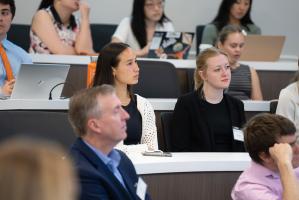
The projects presented at this year’s IEEE Systems and Information Engineering Design Symposium, hosted by the UVA School of Engineering and Applied Sciences, explored alternative solutions to a wide range of problems: a team of Duke University students worked to improve audible safety alerts for freedivers; a Purdue University research group applied systems thinking to assess the performance of spaceports (the sites for launching or receiving spacecraft); and students from the UVA School of Data Science harnessed artificial intelligence as a method for detecting signs of human trafficking in state-level court cases.
One UVA team from the Department of Systems and Information Engineering sought to help neurodiverse members of the Charlottesville community gain meaningful employment.
Building Bridges
Through a local business called VIAble Ventures, the VIA Center for Neurodevelopment provides adults with intellectual and developmental disorders with jobs as artisans, making candles, bath salts, and sachets and selling them online and at Charlottesville farmer’s markets. For Sophie Kikuchi, a fourth-year student in the Department of Systems and Information Engineering, the service-minded business was a dream client for a systems engineering project.
In research showcased at the symposium, Kikuchi and her teammates, advised by systems engineering professors Sara Riggs and Robert Riggs, applied systems thinking to help VIAble Ventures boost its sales and employ more adults with autism. Focusing on online sales, the group found ways to highlight top-selling products on the VIAble Ventures website and put the business’s unique mission front and center online.
“The mission of VIAble Ventures is just one that I've really grown to love,” Kikuchi said. “I feel like it's making an impact in the sense that, hopefully, getting the new website up will help increase the sales and employ more people with autism. The program does a lot of on-site job training and soft-skill teaching. It’s a great stepping stone for these individuals to be able to gain the experience they need to earn a paycheck.”
Kikuchi’s team presented one of the 100 papers featured this year at UVA’s design symposium, which has become one of the field’s leading student-focused forums for applied research, development and design over the past 20 years. Joining Kikuchi and her peers from UVA systems and information engineering at the conference were students from 32 higher education institutions in total, nine of which were international.
From Consulting to Co-design
Another student team from the Department of Systems and Information Engineering looked at ways to streamline operations for outpatient cancer infusion centers, which will need to meet the nation’s growing demand for cancer care.
Rupa Valdez, an associate professor in the Department of Systems and Information Engineering, advised the team as they closely examined the workings of an outpatient cancer infusion center in the Mid-Atlantic region. “It’s exciting to see students learn to integrate their quantitative skills with qualitative approaches to understanding system complexity,” Valdez said. “I also find it meaningful to watch students build trusting relationships with clients throughout the project, enabling us to move from a consulting to a co-design model.”
Kikuchi was able to experience that same shift to co-designing solutions with the client while working with VIAble Ventures. “It’s been really fun working with the people at VIA,” Kikuchi said. “They’ve been so responsive. They like to be very hands-on and give feedback on new website designs. They’re excited about it, too, which has made the experience even better on our end.”
For students, presenting projects at the Systems and Information Engineering Design Symposium each year allows them not only to showcase their own work, but to see the vast array of subjects that systems engineers can explore, Kikuchi said. “It really shows how broadly you can apply the education you get through UVA systems engineering,” she said.